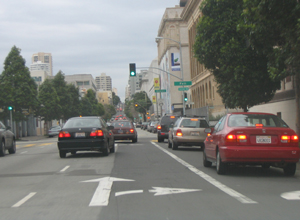What are the 3 parts of vision used while driving?
Central vision
Fringe vision
Peripheral vision
What color are Regulatory, Warning, and Guide signs?
1.) red/white or black/white
2.) yellow/black or orange/black
3.) blue, green, or brown
TRUE or FALSE:
A Safety Stop is where a stop sign or traffic light is present and you must stop before the stop line or marked/unmarked crosswalk.
FALSE:
Correct answer: Legal Stop
Is this target area OPEN or CLOSED?

Closed
This hand signal is saying he's:

A.) Making a right turn
B) Making a left turn
C.) Slowing down
C.) Slowing down
What's the transition peg for right turns?
Space just under the inside rear-view mirror.
Name 2 advantages for using reference points.
Possible Answers:
1.) Help you overcome optical illusions caused by the body of the vehicle blocking your view of the ground.
2.) They show exactly where the left/right side tires are tracking, and help you make reduced-risk lane position adjustments.
3.) They show you the precise position of the front/rear bumpers in relations to intersections, crosswalks, and parking spaces.
4.) Allow you to confidently maneuver your vehicle in confined places/spaces.
How long should you wait to let a pedestrian who is blind, cross the road?
Until they've fully crossed.
How do you measure space in time and why should you do it?
Possible Answers:
1.) 1001, 1002, 1003
2.) 1 Mississippi, 2 Mississippi, 3 Mississippi
Why: You know how many seconds it takes to drive across a street/how long it takes approaching cars to reach your location, you'll know whether you need to wait or go.
What 4 common conflicts cause rear-end accidents?
1.) Driving in a line of traffic
2.) A traffic jam
3.) A vehicle stopped at a traffic light
4.) A vehicle just about to turn left
Headlights make your vehicle how much more visible to other vehicles?
Almost a mile
Most intersections are controlled by what signs?
Regulatory signs
What's Good Driving Habit #5?
Zone Control Searching
What are the 3 Searching Ranges?
1.) Target Area Range
2.) 15-Second Range
3.) 4-Second Danger Zone
TRUE or FALSE:
To increase your control of the rear and front zones, use the slowest speed of traffic possible, LP3, and no communication.
FALSE:
Correct Answer: To increase your control of the rear and front zones, use the best speed, lane position, and communication.
What are the best hand positions on the steering wheel for best control and protection against airbag injury?
9 & 3 OR 8 & 4
What does MSMOG stand for and what is it used for?
1.) Mirror, Signal, Mirror, Over the shoulder, Go when safe.
2.)Pulling away from the curb, crossing lanes of traffic, pulling toward the curb.
List 2 things that you should do before you back.
Possible Answers:
1.) Check around the car to be sure nothing's hidden from your view or blocking your path.
2.) Before moving your car, search 360 degrees to look for anything blocking your path/view.
3.) Look to the rear while you're in reverse.
4.) Do NOT rely on mirrors/backup camera to move your vehicle backwards.
How many lane positions are there AND which lane position is best used for a left turn?
5 lane positions
Usually LP2, but when oncoming traffic is present, use LP1.
What is Good Driving Habit #9?
Get Control with Vehicle in Front
What are the steps to tracking your vehicle?
1.) Align top of steering wheel with target.
2.) See target with your central vision, and use lower fringe vision to see steering wheel align with target.
3.) Use fringe and peripheral to see your path-of-travel.
TRUE or FALSE:
A gap is the space between groups of cars called traffic clusters. A hole is the space between 2 vehicles. Gaps are larger than holes and give more time to enter/cross traffic.
FALSE:
Correct Answer: A gap is the space between 2 vehicles. A hole is the space between groups of cars called traffic clusters. Holes are larger spaces than gaps and give you more time to enter or cross traffic.
TRUE or FALSE:
Before making a U Turn, make a thorough 360-degree check. Accelerate your speed and use your fringe vision while turning.
FALSE:
Correct answer: Keep your speed slow, target your new path-of-travel before you turn the wheel, and use as little space as possible.
For space management principles, anytime LP1 is REQUIRED, you should:
A.) Maintain speed
B.) Accelerate speed
C.) Reduce speed
C.) Reduce speed
How much space should you leave between you and the vehicle in front of you while stopped in a line of traffic?
15 feet